The Jewish Museum of Switzerland showcases the diversity of Jewish history and culture. The collection comprises objects representing centuries of Jewish life in Switzerland. Housed in its new building on Vesalgasse, the museum can now present its Jewish cultural heritage on an even greater scale. The SIG supports this work as part of its mandate.
The Jewish Museum of Switzerland is the central institution for the preservation and presentation of Jewish cultural heritage in Switzerland. The institution shows how Jewish life in its many different forms has been rooted here for centuries. Conveying this heritage and successfully building bridges to the present day are tasks of particular social importance. The SIG shares and supports this important mission of creating broad access to the history, religion, culture and present-day community of Swiss Jews. The SIG and the Jewish Museum of Switzerland stand together in support of shared remembrance as well as a common desire to shape the future.
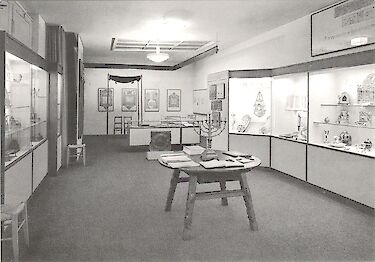
First Jewish museum in the German-speaking world
The Jewish Museum of Switzerland was founded in 1966 as the first Jewish museum in the German-speaking world since the Second World War. The initiative behind the museum came from members of the Jewish society ‘Espérance’ (a chevra kadisha) who had been deeply impressed by the Monumenta Judaica exhibition in Cologne in 1963/64, which included Jewish objects and artefacts from Basel. Dr Katia Guth-Dreyfus (1926–2021) was the director of the museum from 1966 to 2010. She was followed by Dr Gaby Knoch-Mund, director from 2010 to 2015. Since 2015, the museum has been headed by Dr Naomi Lubrich. Today, the museum is located in its new building on Vesalgasse in Basel. The former tobacco warehouse has been completely renovated and now offers significantly more space for exhibitions, research and education. The proximity to the historical Jewish Cemetery of Basel anchors the museum in an area of the city that has a long Jewish history.
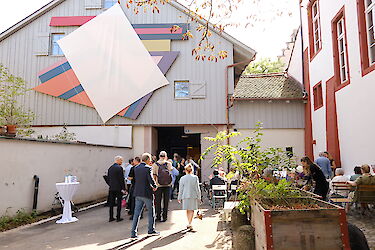
Collection and key aspects of Jewish history in Switzerland
The first objects to be displayed at the Jewish Museum of Switzerland came from the Judaica collection of the Swiss Museum of Folk Culture (today called Museum der Kulturen Basel). In the following years, the collection was expanded with items from Basel and the Upper Rhine region, from the two Jewish villages Endingen and Lengnau in the Surbtal valley, as well as from numerous other parts of Switzerland and Europe. Special mention must go to the ‘Lengnauer Mappot’, a collection of 218 Torah pennants from a period of almost 300 years.
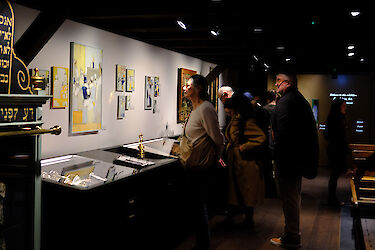
Spanning two floors, the new permanent exhibition in the building on Vesalgasse takes visitors through the past and present of Judaism in Switzerland – from Roman antiquity through to today. The ‘Cult’ section sheds light on the strong ties between the Jewish communities. In the ‘Culture’ section, topics such as origins, self-determination and survival tell a story that is as unique as it is eventful. Relations with the non-Jewish community were shaped by the pursuit of equality, the development of urban communities, antisemitism and self-assertion. The exhibition sheds light on community life and invites visitors to participate, gives contemporary art the opportunity to comment on historical traditions, and showcases the lives and work of Jews in good times and bad. Special exhibitions are held alongside the permanent exhibition. The museum is currently showing works by Frank Stella, including the ‘Frontispiece’ and the ‘Polish Village’ series, which depicts destroyed wooden synagogues. The exhibition runs until January 2027.
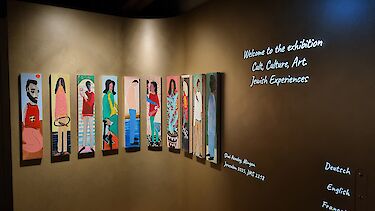
Presenting Jewish life and public discourse
The Jewish Museum of Switzerland sees itself as a cultural attraction as well as an educational and meeting space. It contributes to the public discourse on Jewish life and history in the form of special exhibitions, events, tours and publications. Since 1999, the museum has also been responsible for coordinating the Swiss programme at the European Day of Jewish Culture. The presentation of Jewish cultural heritage gains an even greater significance in the new building on Vesalgasse: more exhibition space, a modern setting and an expanded educational programme allow for an in-depth examination of the history, present, culture and religion of Jewish life in Switzerland and beyond.
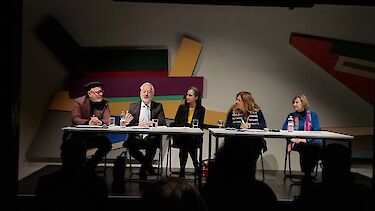
Close relationship and cooperation with the SIG
For the SIG, the Jewish Museum of Switzerland is an important partner for the presentation of Jewish history, culture and religion. Ensuring the preservation and visibility of Jewish cultural heritage is one of the association’s primary tasks. Through its presence on both the museum’s board and the patronage committee of the new building, the SIG supports this work on both an organisational and strategic level. In its external activities, the SIG promotes knowledge about Judaism in Swiss society by shedding light on history, the Shoah, culture and religious traditions, thereby strengthening the basis for dialogue and mutual understanding. The museum’s new home improves the conditions for this and creates more opportunities for joint educational work.
-
Further information